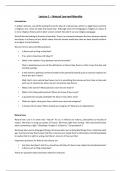Lecture 1 – Natural Law and Morality
Introduction
In today's lectures, we will be looking first at the idea of a natural law, which is a legal theory and not
a religious one, I have to make that quite clear. Although some of its language is religious in nature it
is not a religious theory and its later version certain they don't use any religious language.
We will also be looking at theories of morality. There is a connexion between the two, because natural
law theory is a theory of law, which states that the human made laws that we have should conform
to a higher moral standard.
We are here to ask some BIG questions:
• Is there such a thing as bad law?
• If so, when should we still obey it?
• What is the relation if any between law and morality?
That is asked because one of the definitions of natural law theory is that it says that law and
morality overlap.
• Is law merely a political command made by the powerful backed up by a sanction imposed on
those who don’t obey?
Well, that's not a natural law theory, but it is something that comes up from time to time and
we'll see its importance when we turn to positive law theory.
• What is the law for? What job does it do? Do we need it?
• What is this thing called justice? When do I know if law is just?
• Is punishment morally justifiable? Or does it have other aims?
• What are rights, who gives them, which ones must we recognise?
• Is human life of value? When should we recognise it? What are its implications?
Natural Law
Natural law: Law is in some way “natural” for us. It reflects our nature, particularly our faculty of
reason. We know it using our power of reason. We know right from wrong. “We instinctively know
when something is right.” [Readings: Chapter 2 of Spiers’s “Jurisprudence”]
We know when we're doing good things. We know when we're doing bad things from a relatively early
age. And natural law theory says that this is because we simply have to think about something deeply
to realise that it is right or wrong. But there's more to it than just that.
Important questions for Natural Law theory are:
• Are there bad laws? And if so, should we still obey it? How is law related to standards/value?
• Is there such a thing as bad law?
These are questions that have been asked for centuries.
, And for a long time, people really didn't have a satisfactory theory of law. I'm not entirely sure that
today we have a generally accepted satisfactory theory of law. Most theorists tend to either go on one
side of the divide between natural law theory and positivism or they go to the other. Very little else
really seems to have been taken up, although I think there are contenders, and we will be looking at
some of them during this course.
• Are there any laws you disagree with / think are unjust, unfair?
• What do we do about it?
• What have others done about it? …
Well, people have over the centuries recognised some laws as being grossly unfair. And generally there
are a number of responses to this.
Civil disobedience
Answers have varied – the worse the laws are, the more extreme the reaction has been:
• Protests at government policy – a democratic right?
There are, for example, protests at government policy, which is regarded as a democratic
right. And if you think that something is unjust, some circumstance or some law is unjust in its
effects, then we can go and protest at either the Westminster or the Scottish Parliament,
depending on who has the power to deal with it.
• Activism – someone’s got to do something! How far to go?
Activism is taking the law into our own hands in an attempt to force those who are doing
something that we consider to be unlawful to change.
• Resistance to evil regimes and their institutions – e.g. fighting the Nazis
• Revolution – French / American (take your pick). Throw out the makers of unjust laws. Behead
them if you are French. And substitute something better.
We all know good law when we see it. It is just and moral. But what is the relation between law and
justice? … What do these words mean?
Justinian’s Institutes 535 C.E. (Common era)
Justinian was a Roman emperor. He wrote extensively about law and, in fact, quite a lot of our
common law depends upon Justinian's Institutes. This is what he wrote about natural law:
“The law of nature is that law which nature teaches to all animals. For this law does not belong
exclusively to the human race, but belongs to all animals, whether of the earth, the air, or the water.
Hence comes the union of the male and female, which we term matrimony; hence the procreation
and bringing up of children. We see, indeed, that all the other animals besides men are considered as
having knowledge of this law. Civil law is thus distinguished from the law of nations…”
What he means about this is that the Roman law, which was called the civil law, is distinguished from
the law of other nations. The Romans thought that their law was superior to other nations, but they
recognised that most communities had laws that happened to coincide, like the prohibition against





